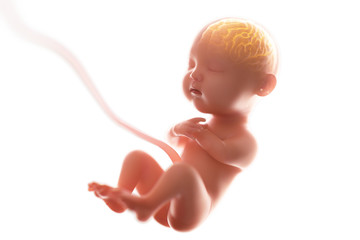
Inadequate maternal diet and high stress during pregnancy are risk factors for poorer cognitive and social development in early childhood. In a study previously highlighted in the September 2023 issue of the Mindfulness Research Monthly, Crovetto et al. investigated the effects of Mindfulness-Based Stress Reduction (MBSR) or a Mediterranean diet on toddlers whose mothers received treatment during pregnancy.
As a secondary outcome of that trial, Nakaki et al. [American Journal of Obstetrics and Gynecology] newly examined fetal MRI and infant neurobehavioral outcomes from a subsample of participants in the original study.
The original study recruited 1,221 pregnant women from Barcelona who were assessed as being at risk for delivering low birthweight infants. The expectant mothers were randomly assigned to one of three study groups: usual treatment, usual treatment plus MBSR, or usual treatment plus a Mediterranean diet. MBSR consisted of eight 2.5 hour weekly group sessions, a full-day retreat, and home practice. It followed a MBSR syllabus that included a specialized focus on maternal yoga and mothers’ relationships with their fetuses.
The Mediterranean diet intervention involved monthly 30-minute assessments and 1-hour group sessions conducted by trained nutritionists. Participants received monthly supplies of extra virgin olive oil and walnuts, along with weekly suggested shopping lists, detailed meal plans, and menus. The usual care group received pregnancy care following current institutional protocols.
A randomly selected subset of 692 infants from the original trial underwent assessment using the Neonatal Neurobehavioral Assessment Scale (NBAS) at 1-3 months of age. The NBAS provides measures of infant sensory, motor, arousal, and autonomic nervous system development. Additionally, a smaller subset of 90 mothers underwent MRI scanning at 35-39 weeks into their pregnancies to assess brain development of their unborn fetus.
The results showed that fetuses of mothers who participated in the Mediterranean Diet intervention had significantly larger total brain volumes, corpus callosa, and right frontal lobes compared to fetuses of mothers in the usual treatment group. Fetuses of mothers who received MBSR had significantly larger left anterior cingulate gyri than fetuses in the usual treatment group. There were no significant differences in fetal brain development between MBSR and Diet groups.
Mediterranean Diet infants scored higher on NBAS measures of autonomic stability, attentiveness to external stimuli, and range of arousal compared to infants in the usual treatment group, while MBSR infants scored higher on arousal regulation.
The study reveals that maternal Mediterranean Diet and MBSR interventions during pregnancy each both yield observable structural and behavioral effects on fetal and infant development phases.
The limitations of this analysis include the evaluation of only a small subset of the original study participants, and the possibility that findings applicable to a higher-risk population of expectant mothers may not hold in the broader population.
Reference:
Nakaki, A., Crovetto, F., Urru, A., Piella, G., … Gratacos, E. (2023). Effects of Mediterranean Diet or Mindfulness-Based Stress Reduction on fetal and neonatal brain development A secondary analysis of a Randomized Clinical Trial (IMPACT BCN). American Journal of Obstetrics & Gynecology.
Link to study